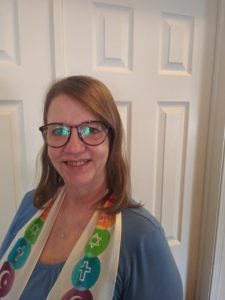By Walter Greene
 Kaye Love’s relationship with faith and spirituality has taken many shapes over the years. Kaye grew up agnostic, but with Methodist grandparents and a father interested in Buddhist and Hindu beliefs, she was exposed to spirituality at an early age. By the time she was in college, Kaye ended up in campus ministry, joining the Methodist church at her school. Her involvement with communities of faith has only expanded since then.
Kaye Love’s relationship with faith and spirituality has taken many shapes over the years. Kaye grew up agnostic, but with Methodist grandparents and a father interested in Buddhist and Hindu beliefs, she was exposed to spirituality at an early age. By the time she was in college, Kaye ended up in campus ministry, joining the Methodist church at her school. Her involvement with communities of faith has only expanded since then.
“I’ve been a member of a coven, and an ethical society, I’ve done some Buddhist things and some Sikh things . . . I’ve just always been fascinated with mythology and the different ways that God/the universe speaks to people.”
This fascination of Kaye’s led to an interest in interfaith ministry, which she finally committed herself to pursuing after listening to a speech by Jimmy Carter about the importance of church leadership positions for women. The former president elaborated, explaining how when women are leaders in the church, people see them as capable of being leaders in the community. Kaye determined that this same point could be applied to people with disabilities.
“I thought about the importance of people having their first volunteer positions in their faith communities and the opportunity to be seen as somebody who’s productive and good at making contacts. Having that role of giving back to the community is something important that most people don’t have when they have a disability and can’t get into the church, synagogue, etc. . . . If people are going to their faith communities for ways of creating meaning and purpose in their life, and their faith community is not set up to let them do that when they’re having an experience of disability, it takes away the ability for people to create meaning and purpose out of their disability.”
When working with as powerful of an institution as religion, structuring congregations with the sort of recognition, representation, and acceptance of disability that Kaye is describing can yield results that make a lasting impact within and outside of the community they originated in.
“That [representation] helps us to have more opportunities in the community, but it also strengthens–whether it is a church, synagogue, ethical society, or a mosque–that organization because it has the whole range of human experience, and we learn to see people as whole and complete regardless of their physical embodiment, or their thinking, or their feelings.”
Now an ordained minister, Kaye has the accreditation necessary to make the changes she has in mind for communities of faith in terms of representation. “I’m really just starting on this path. . . I would like to do consultation with faith communities about how to make their facilities, education, and volunteer programs in theology more accessible for their benefit, and for the people with disabilities who would go there. . . my focus is dealing with internalized ableism, and helping people develop more self-compassion when they have an experience of disability. There’s a lot of problems with accessibility and faith education, congregational education, congregational volunteer positions, and things like that.”
It’s a great effort to be made, and as a social worker, job coach, career consultant, certified special educator, and psychotherapist, Kaye certainly has her hands full. But with a dedication to faith and disability advocacy, Kaye Love’s commitment to greater accessibility and representation for disability in communities of faith holds great promise.
“What spirituality has to give everyone is knowing that they’re more than what they are, what they do, how they think, and how they feel. I think that’s especially important to people with disabilities who have had cultural conditioning that tells them that they don’t have as many opportunities for meaning and purpose in their lives.”
If you’re looking to hear more from Kaye, check out the latest episode of the True Tales by Disability Advocates podcast, “Community, Faith, and Inclusion,” available now on Spotify, Apple Podcasts, and wherever else podcasts are streamed. Want some more? Check out her stand up, available right here and here, as well her story “Pity Fatigue.”
